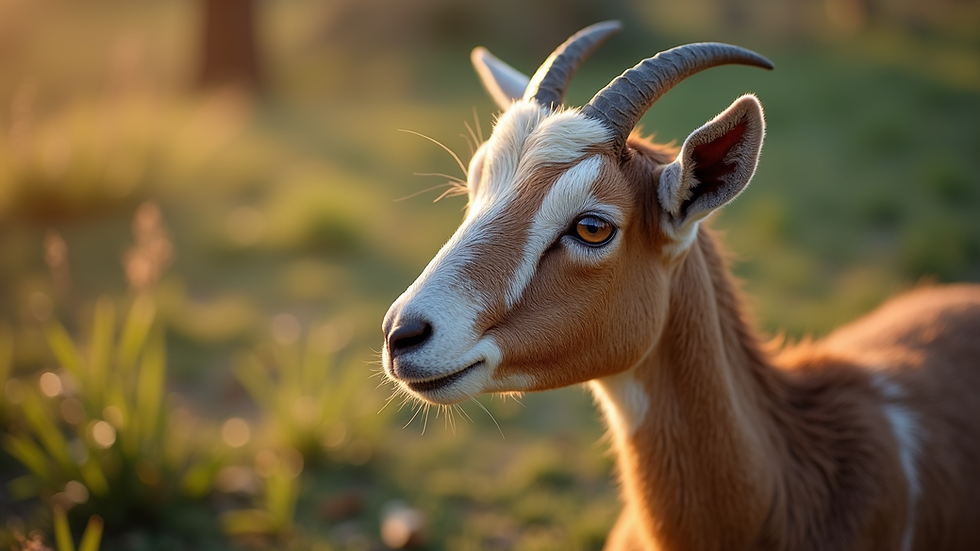Top Tips for Buying Healthy Goats
- maryclark5219
- Jul 4, 2025
- 4 min read
Buying healthy goats is an exciting venture, whether you're starting a small farm, enhancing your homestead, or simply seeking companion animals. Goats are known for their hardiness, wonderful temperament, and multiple purposes, making them incredibly rewarding animals to keep. However, ensuring that you’re selecting healthy goats is crucial to your success. This blog post will provide you with essential tips to consider before purchasing your goats.
Buying Healthy Goats: What to Consider
When it comes to selecting goats, there are several factors you should keep in mind. These include breed, age, health status, and overall functionality of the goats. Each of these aspects can impact your experience as a goat owner, so let’s dive in.
1. Choose the Right Breed
Different goat breeds serve different purposes. Some are great for milk production, while others are raised primarily for meat or fiber. Researching goat breeds is essential to find the right fit for your needs. For instance:
Dairy Goats: Breeds like Saanen and Nubian are excellent for milk production.
Meat Goats: Boer goats are known for their meat quality and are popular in farming.
Fiber Goats: Angora and Cashmere goats produce valuable fibers that can be sold or used.
Understanding the traits and needs of each breed will help you make an informed decision and ensure your goats are well-suited to their intended purpose.

2. Observe Their Health and Behavior
Before making a purchase, it is vital to thoroughly observe the goats and assess their health and behavior. Healthy goats are alert and inquisitive. Here are some health signs and behaviors to watch for:
Physical Condition: Look for clear eyes, shiny coats, and a healthy body weight. A goat that is excessively thin or excessively overweight might have health issues.
Behavior: Goats should be active and social. If a goat is isolated, lethargic, or showing signs of aggression, it may indicate health problems.
Signs of Illness: Check for signs such as coughing, runny noses, or diarrhea.
If possible, ask for health records, including vaccinations and veterinary checks, to ensure that the goats have received proper care.

3. What is the Average Price of a Goat?
The cost of goats can vary significantly based on their breed, age, and health status. Generally, prices can range from $100 to over $500 for standard breeds. For example, miniature breeds might be less expensive, while purebred dairy goats or exotic breeds can top the higher end of the spectrum. Here is a rough breakdown:
Miniature Goats: $100 to $300
Standard Breeds: $200 to $600
Show Quality Goats: $500 and above
Prices may also fluctuate depending on geographic location and market demand, so be sure to check local listings or resources for current pricing trends. Exploring platforms such as goats for sale can provide insights into what you might expect to pay.

4. Understand Basic Goat Care
Before bringing goats home, familiarize yourself with their basic care requirements. Goats need proper shelter, nutrition, and companionship to thrive:
Shelter: Provide a clean, dry, and well-ventilated barn or shed. Goats should have enough space to move freely and stay protected from harsh weather.
Nutrition: A balanced diet is vital for healthy goats. Their diet typically comprises hay, pasture grazing, and grains mixed with minerals. Consult with a veterinarian for specific dietary needs.
Social Animals: Keep goats in pairs or groups as they are social animals, and solitary living can result in stress.
By being prepared, you can create an optimal environment for your goats, ensuring they lead happy and healthy lives.
5. Know the Seller's Reputation
Purchasing goats from reputable sources is crucial. Whether you're buying from a breeder, a local farm, or an online auction, check the seller's background. Research online reviews and seek referrals to ensure they are trustworthy. Ask about their breeding practices, health history, and if they offer any guarantees on their animals.
6. Consider Timing
Timing can also play a role in your goat-buying experience. If you are interested in dairy goats, for example, consider purchasing them close to their kidding season, which typically occurs in spring. This timing allows for easier integration into your homestead, and you can start milking them soon after they kid.
7. Plan for the Future
When buying goats, it's essential to plan for their long-term needs. Goats can live for over 10 years, so you'll want to consider the future care requirements. This includes regular veterinary check-ups, vaccinations, and providing a suitable living environment. Make sure you are not only ready for the initial purchase but also committed to caring for them for their entire lifespan.

8. Be Prepared for Expenses
In addition to the initial cost of purchasing goats, be prepared for ongoing expenses. Costs can include:
Feed: Depending on the type of diet you choose for your goats, food costs can fluctuate.
Maintenance: Regular hoof trimming, vaccinations, and vet bills can add up.
Shelter and Fencing: Setting up safe and secure facilities may require a one-time investment.
Make a budget that includes all these aspects to ensure that you can provide the necessary care for your goats.
9. Seek Community Advice
Don’t hesitate to reach out to local farming communities or online forums. Other goat owners can provide invaluable advice based on their experiences. Participating in workshops or local livestock shows can also help you gain knowledge and insights that may aid your goat-buying journey.
The more information you gather, the stronger your foundation for raising goats will be.
Final Thoughts
With the right information and preparation, buying healthy goats can be a fulfilling and enjoyable experience. By understanding breeds, health signs, basic care, and community resources, you can set yourself up for success in goat ownership. Prepare to embark on this rewarding journey as you nurture and enjoy the companionship of your new goats!





Comments